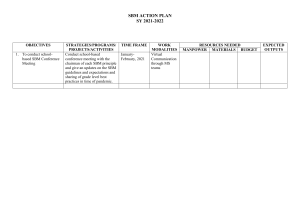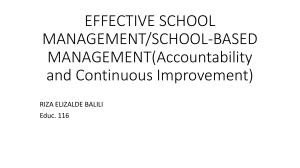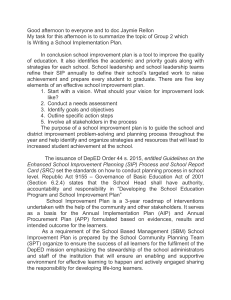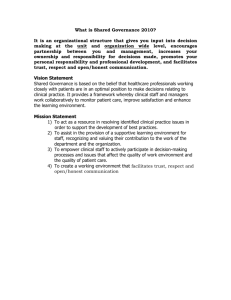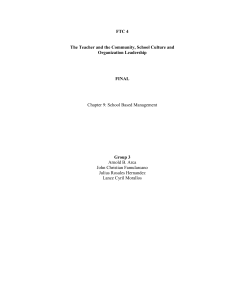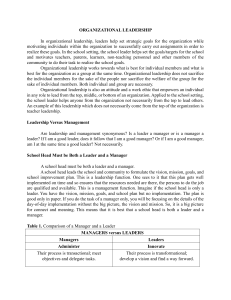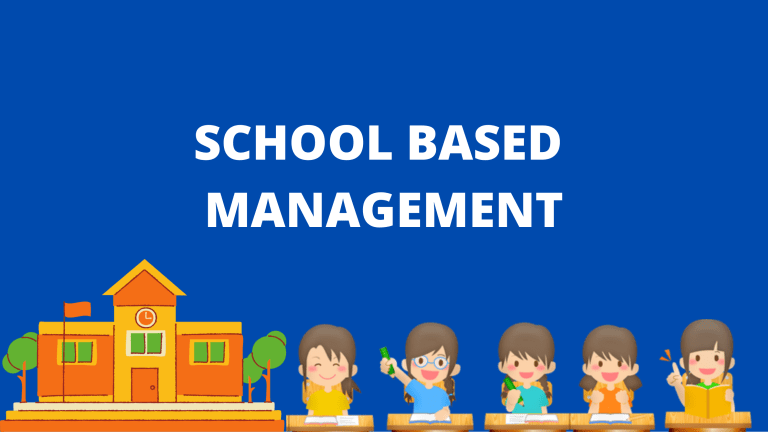
SCHOOL BASED MANAGEMENT LESSON OBJECTIVES 1. Discuss and explain the legal basis, concepts and principles of of School based Management 2. Trace the types of gained resources from School Based Management 3. Make a pledge of commitment to demonstrating SBM principles LEGAL BASIS Article XIV, Section 1 also states that “The State shall protect and promote the right of all citizens to quality education at all levels and shall take appropriate steps to make such education accessible to all.” LEGAL BASIS The implementation of the Governance of Basic Education Act of 2001 (RA 9155) provides the mandate for decentralizing the system of school management anti recognizes the role of the Local Government Units and other stakeholders as partners in education service delivery. LEGAL BASIS Department of Education launched the Schools First Initiative (SFI) in 2015 to empower the school and its community stakeholders to effectively address access and quality issues in basic education. LEGAL BASIS Department of Education issued DepEd Order No. 83, s. 2012 to further strengthen the School-Based Management (SBM) practice and re-emphasize the centrality of the learners and the involvement of relevant community basic education service delivery. SCHOOL BASED MANAGEMENT School Based Management is a Deped thrust that decentralizes the decisionmaking from the Central Office and field offices to individual schools to enable them to better respond to their specific needs. GOALS: the main goal is to improve school performance and student achievement objectives: 1. empower the school heads to lead their teachers & students; 2. bring resources, including funds down to the control of the schools to spur change; 3. strengthen partnership with communities as well as LGU and other stakehilders; 4. integrate school management and instructional reforms to make schools effective CONCEPTS & PRINCIPLES School Based Management is carried out under the principles of subsidiarity & collegiality. SUBSIDIARITY - espouses the idea that problems must be solved and decisions made at the lowest organizational level. COLLEGIALITY - demands that stakeholders work as a team, in the improvement of the school. 4 PRINCIPLES OF A SCHOOL SYSTEM THAT GUIDES THE SBM PROCESS 1. Principle of collective leadership & governance a network of leadership and governance guides the education system to achieve its shared vision. mission and goals making them responsive and relevant to the context of diverse environments. 2. Principle of community based learning the curriculum and learning systems anchored on the community and learners context and aspirations are collaboratively developed & continuously improved. 3. Principle of Accountability for Performance and Resource a clear, transparent, inclusive and responsive accountability system is in place, collaboratively developed by the school community which monitors performance and acts appropriately on gaps and gains. 4. Principle of Convergence to Harness Resource for Education resources are collectively organized, judiciously mobilized and managed with transparency, effectiveness and efficiency to support targeted education outcomes. 4 TYPES OF RESOURCES ARE DECENTRALIZED IN SBM SCHOOLS 1. POWER TO MAKE DECISIONS that can influence organizational practices, policies & directions. Teachers can assist leaders in setting the school's vision, coordinate reform efforts & rally support of the parents and the community for school success. 2. KNOWLEDGE enables all school personnel and other community stakeholders to understand and contribute to organizational performance , including technical & managerial knowledge. 3. INFORMATION about the performance of the school including revenues, expenditures, student performance & strategic information on the broader policy and economic environment. 4. REWARDS based on the performance of the organization and the contributions of individuals . ACTIVITY 4: MAKE A PLEDGE OF COMMITMENT STATING YOUR DESIRE TO HELP THE SCHOOL ACHIEVE ITS GOALS & OBJECTIVES EXAMPLE: I, _______, a teacher from _____, take this pledge to commit to embodying School Based Management principles and raising the level of school performance and student outcome. I am also committed to inspiring and empowering others to achieve these goals.
